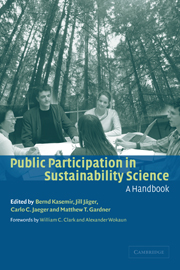Book contents
- Frontmatter
- Contents
- Notes on contributors
- Foreword: science, participation, and sustainability
- Foreword: sustainability, energy use, and public participation
- Preface
- Acknowledgments
- Part I Concepts and insights
- Part II Experiences with IA Focus Groups
- Introduction
- 4 Collage processes and citizens' visions for the future
- 5 Citizen interaction with computer models
- 6 Citizens' reports on climate strategies
- Part III Further forms of participation
- Part IV Future perspectives
- References
- Index
6 - Citizens' reports on climate strategies
Published online by Cambridge University Press: 22 September 2009
- Frontmatter
- Contents
- Notes on contributors
- Foreword: science, participation, and sustainability
- Foreword: sustainability, energy use, and public participation
- Preface
- Acknowledgments
- Part I Concepts and insights
- Part II Experiences with IA Focus Groups
- Introduction
- 4 Collage processes and citizens' visions for the future
- 5 Citizen interaction with computer models
- 6 Citizens' reports on climate strategies
- Part III Further forms of participation
- Part IV Future perspectives
- References
- Index
Summary
Introduction
Citizens' perceptions of climate change have been explored in various empirical studies with quantitative and qualitative methodologies. Dunlap (1998) explored lay perceptions and levels of understanding of climate change in six countries with a quantitative poll. In order to understand perceptions of climate change, Kempton (1991) compared lay perceptions with those of scientists in the US with a qualitative technique, while Bell (1994) looked at differences between media and public discourses on climate change. Other studies can be found in Lőfstedt (1992) and in Read (1994). In the study discussed here, however, the objective was not to look at the perceptions of the lay public per se but to study in which ways citizens can provide reflected and informed opinions, and participate in sustainability science in general and in Integrated Assessments (IA) in particular.
For this purpose, IA Focus Group procedures (see Chapter 1) were developed in the ULYSSES project. While in the first two phases of these procedures collages were produced and models were used (see the discussions in Chapters 4 and 5), the final phase of the IA Focus Groups was mainly devoted to the formulation of citizens' reports – written assessments by the participants themselves. These were usually prepared by first drafting steps and discussions in earlier sessions. What is the problem? What should be done? How should it be achieved? Who should do it? Which barriers are foreseen? These are some of the questions discussed by the participants and addressed in their citizens' reports.
- Type
- Chapter
- Information
- Public Participation in Sustainability ScienceA Handbook, pp. 126 - 152Publisher: Cambridge University PressPrint publication year: 2003
- 2
- Cited by

